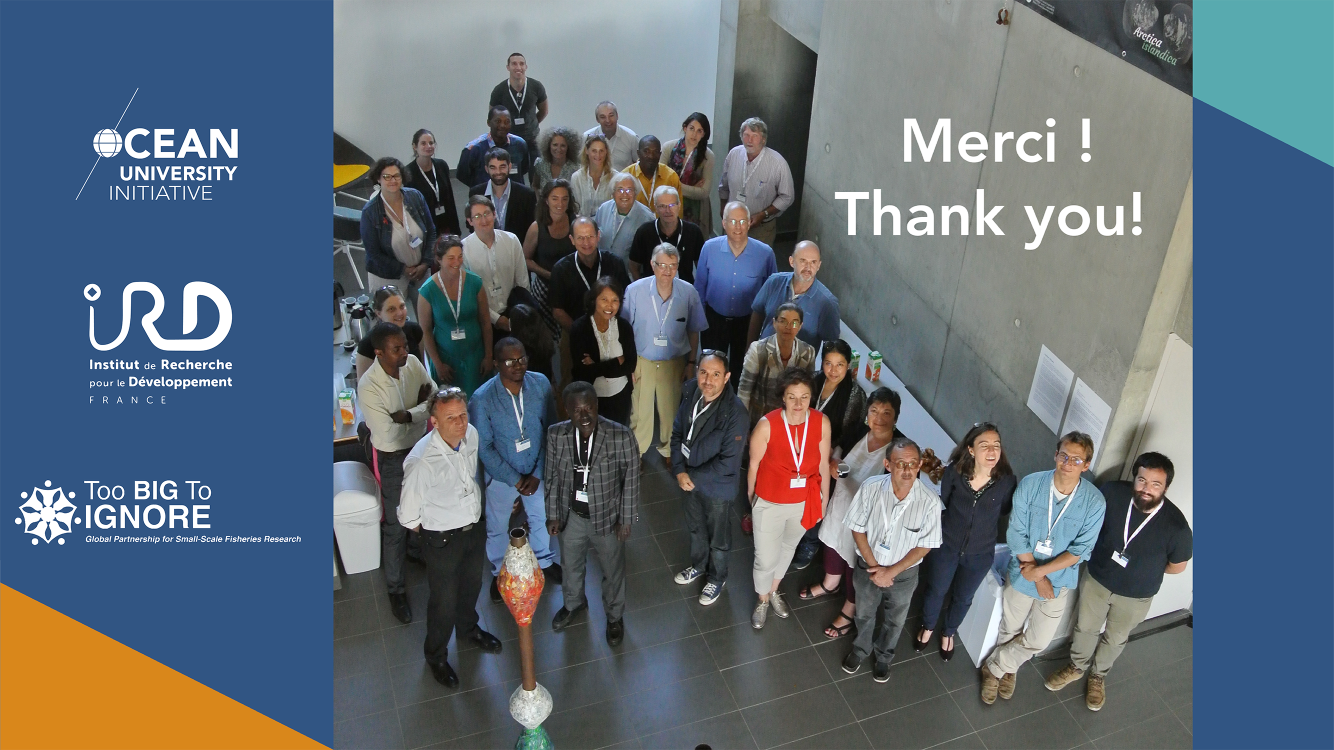The workshop on ‘Small-Scale Fisheries in the South’ held on 25th and 26th June 2018 in Brest France, was organized by the Ocean University Initiative, based at University of Brest (UBO), French National Research Institute for Sustainable Development (IRD) and Too Big To Ignore (TBTI). The objective of the workshop was to bring together researchers, managers, funding agencies, training institutions and consultants to discuss how to better integrate research in development programmes and development aid supporting sustainable small-scale fisheries. The workshop, which was attended by about 40 participants, was organized in seven thematic sessions. The first three sessions presented overview and lessons from several international research programmes dedicated to small-scale fisheries in the South. The two following sessions provided views by managers, funding agencies, educational agencies, and consultants engaged in small-scale fisheries. Finally, the closing session of the workshop summarized the key messages from all the sessions with the purpose of producing a position paper that will be presented at 3rd World Small-Scale Fisheries Congress (3WSFC) in Chiang Mai, Thailand, on 22-26 October 2018.
Professor Ratana Chuenpagdee gave a presentation on the role of Too Big To Ignore Global Partnership for Small-Scale Fisheries Research as a seven-year journey dedicated to elevate the profile of small-scale fisheries through multiple research and networking endeavours. Ratana explained how TBTI has expanded to become a network of over 400 researchers from more than 50 countries, focusing on 14 research clusters that collectively represent the diversities, complexities and challenges of fishing communities around the world. She highlighted that through the Information System on Small-Scale Fisheries (ISSF - http://toobigtoignore.net/issf/), the information on small-scale fisheries has been increasing. Research shows that small-scale fisheries are globally the dominant sector in terms of number of people involved and contribution to local food security and sustainable livelihoods. Yet, Ratana explained, knowledge about small-scale fisheries lags behind that on large-scale fisheries. On this note, she remarked on the need of maintaining the momentum on small-scale fisheries research towards better knowledge on how to sustain viable fishing communities.
Alicia Said, a post-doctoral fellow with TBTI, who also participated in this workshop, highlighted the role of transdisciplinarity in small-scale fisheries research. By referring to the forthcoming TBTI book on “Transdisciplinarity for Small-Scale Fisheries Governance: Analysis and Practice” (Chuenpagdee and Jentoft, editors), Alicia explained the need for an integrated systemic approach to understanding challenges and informing context-specific policy and governance of fishing communities. She highlighted that transcending the boundaries of academic disciplines to understand the close relationship and interactivity between the natural and social dimensions of small-scale fisheries is necessary, especially in the context of achieving the sustainable development goals (SDGs). Alicia explained that SDGs require an integrated understanding of how different goals, such as reduced inequalities, improved livelihoods, smart economic growth, and strong institutions, can facilitate or hinder the sustainability of small-scale fisheries, and how transdisciplinary analysis can inform this research. In her presentation, Alicia also explained what transdisciplinarity involves, what the underlying principles are, and how a team-based approach can actually facilitate tailored interactive and transformative learning that provides new knowledge about the small-scale fisheries problems, and reveal opportunities to move towards pragmatic solutions.
Katia Frangoudes, of University of Brest (UBO) and leader of TBTI cluster women/gender in fisheries, spoke about the integration of the gender/women dimension in SSF research projects. Research projects in fisheries are always forget the gender dimension and particularly women’s role in small scale fisheries. Because usually fisheries researchers don’t use “gender lens” but thanks to international institutions requesting the inclusion of gender equality in research projects some progress are observed. She underlined the important role played by women not only in gathering and harvesting in the near shore but also in trade and processing industry. She also pointed out the role of wives of fishers to support the family activity and in the social reproduction of families and communities. Climate change and extreme events as well food security are the other themes of which the gender dimension should not be forget. The Voluntary Guidelines for Securing Sustainable Small-Scale Fisheries in the Context of Food Security and Poverty Eradication can also support gender equality in fisheries as gender is constituting one of their principles.
















